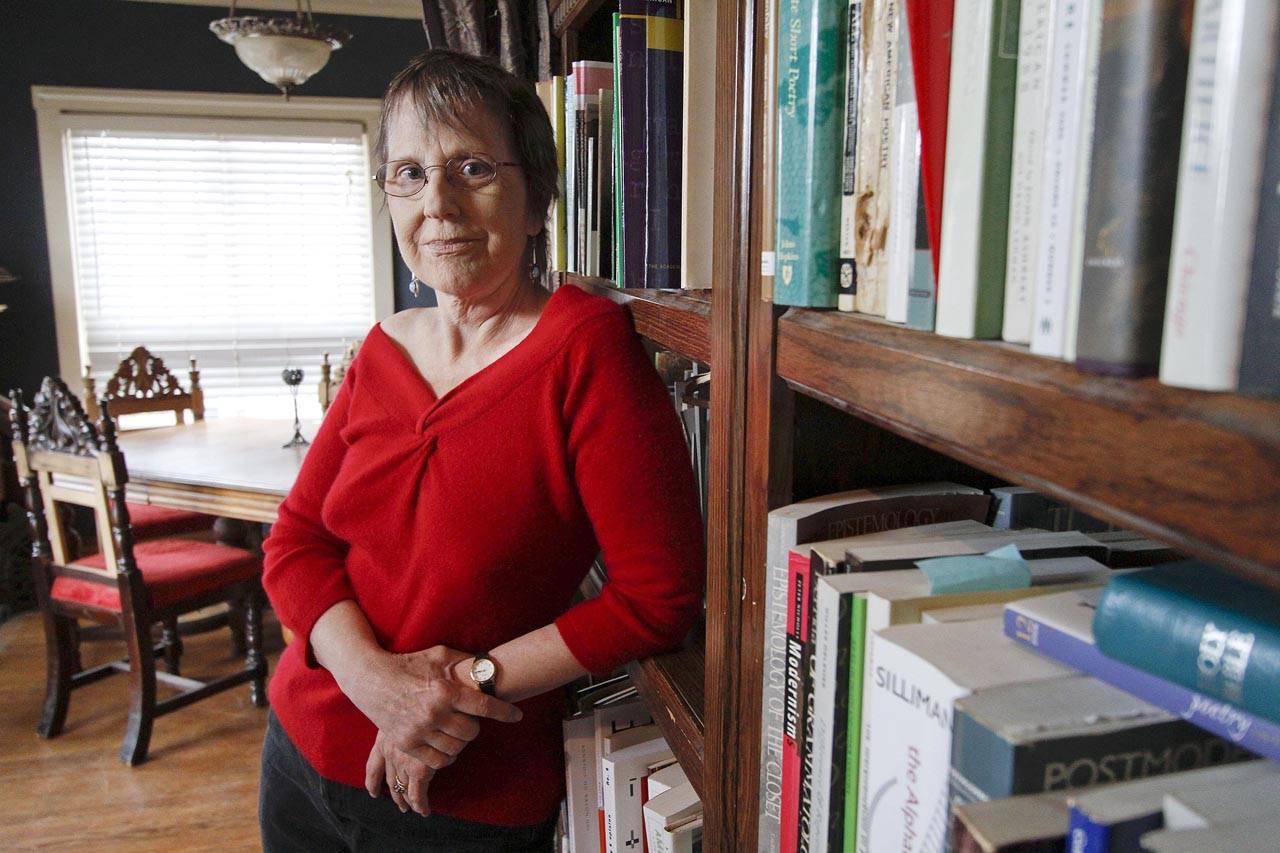She’s known worldwide for her edgy, chiseled and thought-provoking poems. And she lives in the neighborhood.
Rae Armantrout, of Everett, won a Pulitzer Prize for poetry in 2010 for her book “Versed.” Her latest work, “Wobble,” was nominated for the 2018 National Book Award in poetry for its focus on the devastation caused by a chaotic and greedy consumer culture.
Armantrout, 72, will be speaking June 2 at the Everett Public Library.
Here, she explains her methods and inspirations behind her poetry and her thoughts on living in Everett.
What is at the heart of all your poems?
I enjoy poems that surprise me and leave me thinking. That matters more to me than form. One of my favorite poets is Emily Dickinson. I really appreciate her original use of language; she puts words together in ways I’ve never seen elsewhere. My own poems use contemporary language. Most have short lines. It would be fair to say they are a bit edgy.
What themes have you focused on lately?
Whatever interests or concerns me gets into my poems. I was really struck by the fires here and in California last year. I’ve been reading about climate change and extinction. Having young granddaughters makes this issue more pressing for me, and so it has come into my recent work. I plan to talk about this at the library. I will also read some poems that focus either on observing nature or on threats to the environment.
What is one thing you wish more people knew about writing poetry?
If you want to write poetry, you need to read poetry.
When I was a teenager, one of my teachers gave me an anthology of modern poetry. I responded to the way William Carlos Williams could make short lines of free verse sound really good. I learned from him by imitating his line.
Where do you find inspiration?
First, I remember to pay attention to what’s around me. If I’m at a cafe, I listen to what strangers are saying. If I’m outside, I look at the plants and insects. My best advice is the advice they give kids at a crosswalk: stop, look and listen. Second, I read about things that interest me. Lately I’ve been reading about the effects of climate change. Often what I’m reading — and it may just be a newspaper — makes me want to write.
Who are your biggest influences?
William Carlos Williams was one of the modernist poets of the early to middle 20th century. His peers were people like T.S. Eliot, Ezra Pound, Marianne Moore. Also, Ron Silliman is someone I met in college. We were both studying poetry at Berkeley. Later we were part of a group of young poets in San Francisco who wanted to shake things up. We challenged and encouraged one another. I still show him my poems before I publish them. There is such a thing as a community of poets. Young poets need to find theirs.
What do you get from writing poetry?
Thought and feeling are ephemeral. Poems can make them last. For me, poems are a way of processing experience. They are also a way of singing to myself.
Why did you move to Everett?
I moved to Everett from San Diego where I taught for 35 years at University of California San Diego. My husband and I moved here two years ago to be near our new granddaughters in Seattle. We bought a sweet craftsman house in the Riverside neighborhood. Having moved from a dry climate, we are really taken with the natural beauty of the Pacific Northwest. We also are enjoying being in a small city.
Tell me about your poem-writing process.
I carry a blank book with me so that, if I get an idea, I can take a minute to write it down before I forget it. If you do that, you will find you have more time than you think.
I make notes all through the day, but I put things together in the morning over coffee when my thoughts are freshest. Sleep stirs things up. I think I’ve always been this way.
I move bits around, juxtapose them, to see what resonates with what. Most of my poems are written in sections separated by an asterisks or some other device. A poem is a kind of system in which all the parts communicate with one another.
What is “pre-writing” and why is it helpful?
Pre-writing for me is the writing I do on the fly. I don’t worry at that point about whether it’s good. When I have time, I decide if it’s interesting and, if so, I start to carve it, make it concise.
You were young when you started writing poetry. Is there a right time to start?
People may find they have more time to write when they’re older. Poetry, as I said, is one way to process experience, and older people have had a lot of experiences they may still need to process.
It will take years of practice. But if you love what you’re doing, you don’t really think about the time it takes.
What advice do you have for people who want to write poetry?
You are part of the world. Put your world in your poem.
Don’t say in 15 words what you could say in five.
Don’t fill every minute with distractions. That’s what we do these days. Take time to look around you and to listen to your own mind. You have to have time to hear yourself think — and that’s rare these days.
Evan Thompson: 425-339-3427, ethompson@heraldnet.com. Twitter: @ByEvanThompson.
If you go
Rae Armantrout will read from “Wobble” at 2 p.m. June 2 at Everett Public Library, 2702 Hoyt Ave., Everett.
The event is free. Call 425-257-7640 or go to www.epls.org for more information.
Talk to us
> Give us your news tips.
> Send us a letter to the editor.
> More Herald contact information.

























